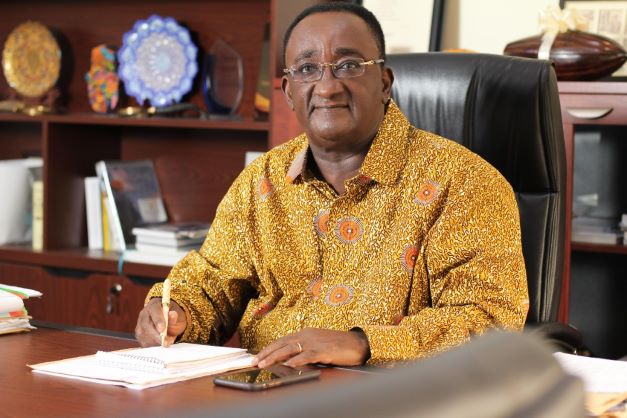An aspiring flagbearer of the New Patriotic Party (NPP) for the 2024 election, Dr Owusu Afriyie Akoto, who until recently was Ghana’s Food and Agriculture Minister, has said that his administration, when elected, will lift Ghana out of the cycle of poverty, through massive investment in the agricural sector.
This, he assures, will not only boost food and nutrition security, but also, generate the necessary resources for the development of the other sectors including industry, health, education and infrastructure in the medium to long term.
He made this pledge when he delivered a speech titled, ‘the future of the economy of Ghana; transforming agriculture for the prosperity of all,’ at the University of Professional Studies – Accra, yesterday.
Food Security and agricultural investment
Dr Akoto predicted that food, renewable energy, water and big data, will drive the new economic order which will come, and Ghana has the potential to lead this new order by strengthening all sectors of the economy and transforming agriculture sustainably to feed and enrich its people, whilst contributing to the food and nutrition needs of the estimated 9.7 billion global population by 2050.
He noted that the development of many of the most advanced countries was tied to the investment in, and growth of the agricultural sector.
Dr Akoto pointed to the examples of countries like Brazil, China, Malaysia and Thailand who in recent times have ridden on the back of growth in the agricultural sector to develop their countries.
Similarly, countries in the European Union like Germany, France, Italy, Spain, and the UK, have shown that investments in agriculture can impact economic transformation.
This was the case in the period between 2000 and 2020 when through concerted development of improved varieties of crops, and the scaling up of same increased yields, improved market and trade conditions, contributed to the increase in world food supply, security and trade.
This drive was indispensable for combating hunger and malnutrition in the EU.
This project injected 26 billion Euros into the EU economy, as well as created and secured more than 90,000 direct jobs in its agricultural value chain.
In view of this lesson from elsewhere, Dr Akoto pointed to a number of initiatives taken while he was in office to boost agricultural production in the country.
1.7m farmers
These include the procurement and distribution of about 1.4 million metric tonnes of fertilizer and 93,192MT of improved seeds which were distributed to over 1.7 million farmers from 2017 to 2021.
GH₵2.6bn subsidies on seeds and fertilizer
Further to that, an investment amount of about GH₵2.6 billion was made as subsidy on improved seeds and fertilizers in the same period the period.
These led to maize yields in the country increasing from around 1.8 Metric Tonnes per hectare to three metric tonnes per hectare.
Similarly, rice and soya yield in the country increased from 2.7 metric tonnes per hectare to four metric tonnes per hectare and from one metric tonne per hectare to 2.5 metric tonnes per hectare, respectively.
Planting for Food and Jobs
Dr Akoto also stated that with the introduction of the Planting for Food and Jobs (PFJ) intervention, production of maize rose from 1.7 million MT in 2016 to 3.6 million MT in 2021.
Rice production rose to 1.2m MT
Rice rose from 688,000MT to 1.2 million MT and soya from 143,000 MT to 230,000 MT over the same period.
By 2021, the beneficiaries had grown to 1.7 million farmers out of a total farmer population of 3.1million in Ghana, up from an initial 202,000 farmers.
Tree Crop Diversification
Dr Akoto also said that there are lessons to be learnt from Ghanaians frequent visits to the International Monetary Fund (IMF) for debt assistance, key among which is “the urgent need to expand the export earning capacity of the economy.”
He thus stressed that “only the agricultural sector can establish that capacity to achieve sustained rapid economic growth.”
“I strongly believe that prioritising agriculture is a sure way for achieving the accelerated growth needed in the other sectors of the economy and creating the needed jobs for our people.”
He touted how he initiated the establishment of the Tree crop Development Authorityto coordinate and promote the development of six tree crops – cashew, rubber, oil palm, coconut, mango and shea, with the aim of developing, producing and distributing the selected cash crop seedlings to farmers to produce and generate a combined potential of export earnings of between $6 billion to $12 billion per year after 8-10 years of implementation.
Cocoa
Besides these selected crops, he also focused on the development of the cocoa sector, where he talked about the designing of the National Cocoa Rehabilitation Programme (NCRP) in 2020 to renew the productive capacity of the cocoa industry.
According to him, this was done to scale up the promotion and production of Cocoa to provide more income to the economy and farmers and create more jobs.
This was a huge success, as thousands of farmers who had abandoned their farms, mainly due to the effects of the Swollen Shoot Virus Disease returned to them.
Due to this programme, he said, a total farm area of about 56,343 hectares had been fully treated across the cocoa growing regions of Ghana as of September 30, 2022.
Dr Akoto was optimistic that when fully implemented, the NCRP should generate more foreign exchange earnings from cocoa.
Poultry Sector
He indicated that as part of efforts to assuage the suffering of the nation’s poultry farmers, he would establish a Grain Development Authority (GDA) whose major duty will be to address the cost of feed.
He said that the GDA “will purchase grains at the time of harvest when the prices are low, store the grains and release them to the poultry farmers and other stakeholders in the value Chain.”
Additionally, when seasonal prices rise, various interventions have been made to increase production in other areas of the Livestock industry.
Dr Akoto further stated that his administration will regulate the importation of chicken and other meat products.
Agric mechanisation
The flagbearer hopeful revealed that since 2017, the Ministry has received and distributed a total of 12,200 pieces of agricultural machinery and equipment from Brazil, Czech Republic and China at 40% subsidy to farmers around the country.
These include tractors, harvesters, irrigation equipment, food processing and post-harvest management equipment.
Additionally, a tractor assembling plant is being established near Ejisu in the Ashanti Region.
He again revealed that processes have been concluded with the Exim Bank of India to provide a facility to import $150 million worth of farm and agro-processing machinery, which are expected to be delivered in Ghana in the course of the year.
According to him, some 32 District Assemblies and selected private sector operators have benefitted from a scheme to create Agricultural Mechanisation Centres to provide hiring Services to both small- and large-scale farmers.
The Presidential Aspirant also touted the role he played in the establishment of the Grains Development Authority (GDA), the development of a memorandum proposing legislation requiring all commercial banks to increase loanable funds to Agriculture and its value chains, which has been submitted to Cabinet, as well as the draft Cabinet Memoranda for the establishment of the Horticultural Development Authority and the Poultry Development Authority.
Women in Agriculture
Dr Akoto also expressed the view that if issues of illiteracy, lack of knowledge
or appreciation of technology, land acquisition and ownership issues, amongst
others is addressed among women farmers, who contribute to over 70% of food crop production in the country, productivity will increase significantly.
Political Will
Touching on his vision of a prosperous Ghana, he said that there was the need to “prioritize agricultural transformation at the highest level of government through the implementation of a well-defined vision and strategy. The investments needed to achieve sustainable food systems will be non-negotiable in my vision to transform agriculture for the prosperity of all.”
He also stated that in addition to the Economic Management Team headed by the Vice-President, there shall be a newly created Agricultural Management Team (AMT) which shall comprise seven Agric-related Ministries, namely: Food and Agriculture, Finance, Trade and Industry, Lands and Natural Resources, Transport, Local Government and Rural Development, and Environment, Science, Technology and Innovation.
This AMT shall be chaired by the President himself to drive agricultural development.
Supply chain logistics and market access
To improve supply chain logistics and expand market access, the former Agric Minister said that infrastructure projects such as feeder roads, hospitals, housing, rural electrification, irrigation, storage will be integral in the agricultural transformation agenda.
Big data and technology for evidence-based decision making
He also indicated that “significant Investments shall be made in big data and technology for precise and evidence-based decision making in partnership with the Private Sector.”
Research and Development
Dr Akoto also promised to appropriately fund the research endeavours of the diverse national agricultural research institutions, including the universities, in areas such as agronomy, extension, plant breeding, Integrated soil fertility management (ISFM),
integrated pest and disease management (IPDM), post-harvest management
(PHM) and climate-smart technologies.
He said, “we need to curb the effects of climate change and sustain yields in farmers’ fields, we must grow crops that are resilient to withstand drought, heavy rains and heat.
Sustainable investment in science, technology and innovation in agricultural
development will offer prosperity to all, including small holder farmers.”
Development and Strengthening of Input and Output Market Systems
The Aspirant pledged to “establish an appropriate regulatory framework to leverage private-sector investment across all sectors and promote the efficient distribution of agro-inputs.”
In addition to this, he indicated that the regulatory framework will seek to develop platforms for agricultural innovations, output market structures and incentives that allow for the full realization of the value of increased production.
“A well-funded and competitive private sector can manage and allocate skill and
capital to scale-up agro-processing, value addition and drive long-term, sustainable
agribusiness growth for job creation,” he said.
Fundamental to all this is the adoption of a comprehensive strategy develop the human capital needed to take innovations to scale, along the entire agricultural commodity value chains.
He identified the establishment of farmer field schools, demonstration plots, development of agropreneurs, training of agricultural extension agents and value chain actors to improve efficiency as key to the success of this initiative.
He also promised to support social development programmes aimed at reducing illiteracy among rural households and farmers, to increase the adoption of new technologies.
He stated that his administration will develop curricula that will equip students with
the mindset, knowledge and skills for agricultural education.
- Friday April 26 2024 Newspaper Headlines - 26 April 2024
- Thursday April 25 2024 Newspaper Headlines - 25 April 2024
- Wednesday April 24 2024 Newspaper Headlines - 24 April 2024




